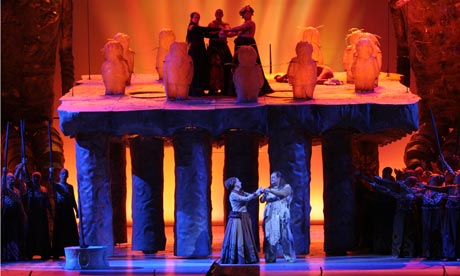
Now the Mariinsky's Ring has drawn to a close, it is perhaps time to ask whether its inadequacies are the product of foolhardiness or, as some have suggested, hubris on the part of the company's music director Valery Gergiev. Gergiev is not so much the cycle's conductor as its guiding spirit. Its defining characteristics – multiple role castings; performances over four days, rather than six – are attributable to him. The production is credited as being "revised" by Alexander Zeldin, but is based on an "original concept" by Gergiev and designer George Tsypin. One wonders whose lapses of vision are responsible for its messiness.
Gergiev's approach to Wagner is slow and beautiful, too much so at times, since his spacious tempos can result in moments of near-stasis. The sonorities are ravishing, though imprecise ensemble playing in Götterdämmerung indicated an orchestra beginning to tire. Of the four operas, Siegfried suits Gergiev best, its mercurial mood forcing him away from measured gravitas towards something more energetic.
The multiple castings, meanwhile, lead to inconsistent vocal characterisations. Olga Savova's thrilling Brünnhilde in Die Walküre is vastly preferable to the vibrato-ridden Olga Sergeyeva in Siegfried, or Larisa Gogolevskaya, vulgar and wilting in Götterdämmerung. The two Siegfrieds are superb, with Leonid Zakhozhaev's lightish-voiced teenage hell-raiser mutating into Viktor Lutsyuk's more conventional hero, but there's little sense of psychological development from one to the other. The cycle's second half does, however, bring back the remarkable Evgeny Nikitin's tragic, complex Wotan and allows us to hear his bullying, psychotic Gunther.
The staging worsens as it progresses. The low point comes in the third act of Siegfried, where, instead of the requisite set change, we watch Brünnhilde sleepwalk on to her rock and lie down prior to being woken by Siegfried. The obsession with supposed mythological congruence results in, among other things, a Woodbird dressed as Isis and Gibichungs got up as Mughal rajahs. It just won't do.
Gergiev's intention is to create a new tradition of Wagner performance in Russia, where the composer's works were suppressed during the Soviet era. But establishing a tradition takes longer than the six years this production has been in the Mariinsky repertoire. Isn't it arrogance on Gergiev's part to assume that we will accept his Ring before it has attained genuine international stature?

